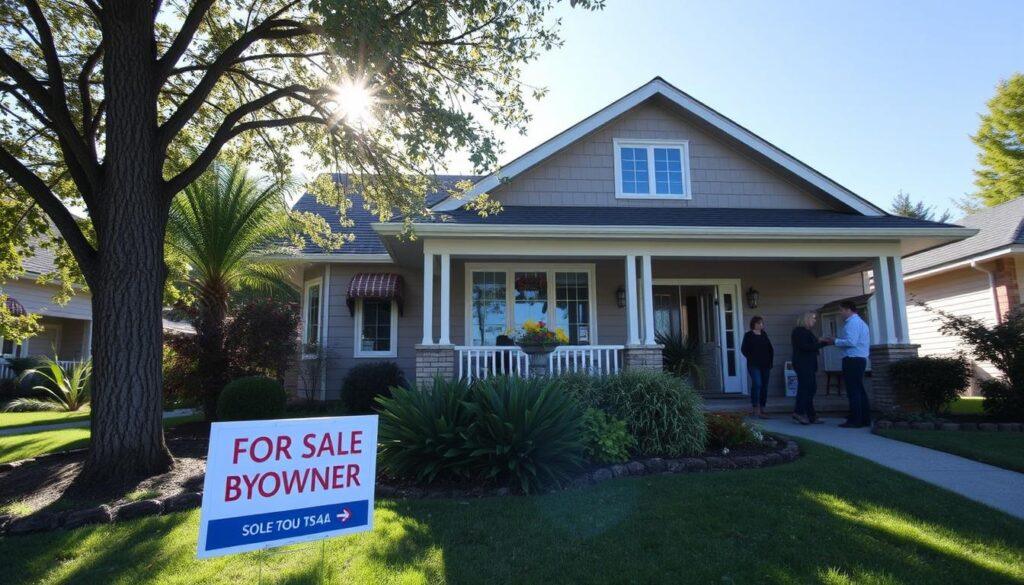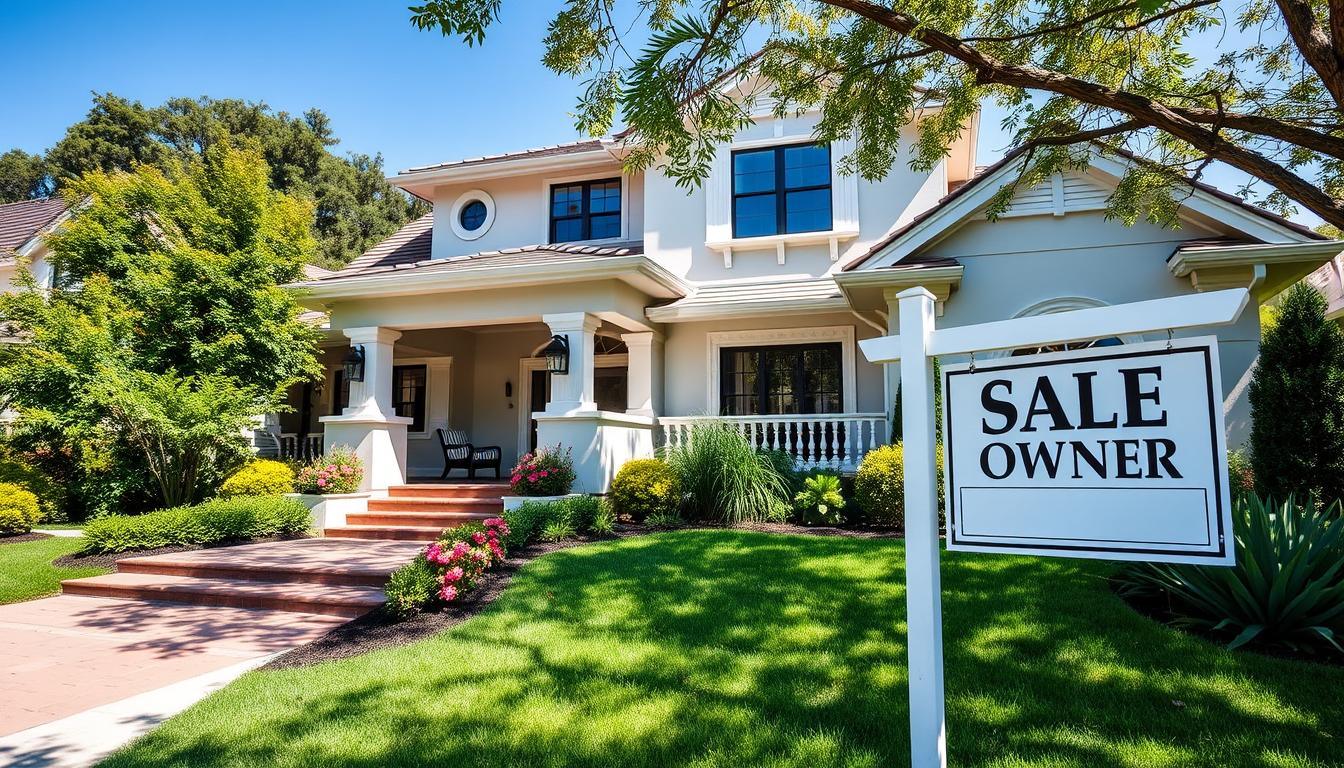Have you thought about selling your house by owner? It might be a smart financial move. More homeowners are choosing to sell property without an agent to save on commissions and keep control. But, it’s not easy. Only 7% of sellers go the FSBO route. Is it worth it?
This guide will show you the FSBO process. It’s packed with practical tips for selling your home. You’ll need to put in time and effort, making choices on pricing and marketing. We’ll cover key strategies to help you sell your home well, making more money and having a smooth sale.
Key Takeaways
- FSBO allows sellers to avoid paying agent commissions and maintain control of the process.
- Professional photography can significantly enhance a home’s sale potential.
- Setting a competitive listing price requires careful market research.
- Online platforms like Zillow and FSBO are essential for reaching potential buyers.
- Flexibility in negotiations can lead to more appealing offers from buyers.
- Understanding closing costs is critical, even when selling without an agent.
- An appraisal can help determine a fair asking price for your home.
Understanding the FSBO Process
Understanding the FSBO (For Sale By Owner) process is key. It’s about knowing what it means and why people choose to sell their homes this way. Many do it to save on commission fees, which can be up to 6% of the sale price.
What does FSBO mean?
FSBO means “For Sale By Owner.” It’s when sellers sell their homes directly to buyers without a real estate agent. About 7% of homes are sold this way. It can be challenging, but many homeowners feel ready to take on the task. They aim to save money by avoiding agent commissions.
Why choose to sell your home without a realtor?
Homeowners choose FSBO for several reasons. One main reason is to save money by avoiding agent commissions. However, selling without an agent comes with its own set of challenges.
- Less market exposure: Homes listed without an agent may not get seen as much. Good marketing is key.
- Professional assistance: Without an agent, sellers face tough sales process challenges. This includes legal stuff and negotiations.
- Price setting: FSBO homes often sell for less than agent-assisted homes. Setting a competitive price is crucial.
- Legal obligations: Sellers must follow laws about disclosures. This includes pest reports and home warranties.
To succeed, sellers should use FSBO selling tips. This includes staging and using great photos. With 90% of buyers looking online, online listings are vital. Hosting open houses and getting help can also make the process smoother.
| Aspect | FSBO | Agent-Assisted |
|---|---|---|
| Commission Fees | 0% to 3% (may still pay buyer’s agent) | 5% to 6% total |
| Market Exposure | Limited, requires personal marketing | Broad, benefits from MLS listings |
| Price Setting | Requires thorough market analysis | Guided by professional insights |
| Legal Guidance | Seller must ensure compliance | Managed by real estate agent |
| Time Investment | High, seller manages all aspects | Moderate, agent handles many tasks |
Understanding the FSBO process is crucial for a successful home sale. With the right approach and knowledge of challenges, homeowners can sell their homes and make a profit.
How to Sell Your House by Owner
Selling a house by owner needs careful planning and action. Knowing how to get your home ready for sale is key. Follow these tips to sell your house by owner successfully.
Steps to Preparing Your Home for Sale
Getting your home ready is the first step in selling it yourself. A well-prepared home attracts more buyers and can increase its value. Here are the important steps:
- Cleaning: Make sure your home is clean. A clean home lets buyers imagine living there.
- Making Repairs: Fix small issues. Fixing leaky faucets and patching walls makes your home look better.
- Staging: Staged homes can sell up to 58% faster. Arrange furniture to show off your home’s best parts.
- Photography: Good photos are key. Homes with professional photos sell 32% faster than others.
Setting the Right Listing Price
Finding the right price for your home is crucial. Use a Comparative Market Analysis (CMA) to find your home’s value. Here are some tips for pricing:
- Research: Look at recent sales of similar homes. This helps you understand the market and price.
- Professional Appraisal: A professional appraisal, costing $375 to $450, gives an unbiased view.
- Commission Savings: Selling without an agent saves you money. You can save 3% on the listing agent and 2.5% to 3% on the buyer agent commission.
- Market Responsiveness: Be ready to adjust your price based on feedback and market changes. This is especially important if you don’t get offers early on.
With these tips, you can get your home ready and price it right. This approach can lead to a successful sale.
Marketing Your Home Effectively
Marketing your home well is key to selling it without a realtor. You need to use both online and traditional methods to attract buyers. This way, you can show off your home to more people. Here are some important steps to take.
Using Online Platforms to Attract Buyers
Most buyers look for homes online. So, listing your home on sites like Zillow, Redfin, and Trulia is a good idea. Here are some tips for selling your house privately:
- Include all the details about your home in the listing, like recent updates and special features.
- Use professional photos, as they can make a bigger impact than how your home looks outside.
- Make a virtual tour to get people interested and increase demand for your home.
- Share your listing on social media to reach more people and potential buyers.
Open houses on weekends let buyers see your home in person. Make sure it’s clean and well-kept, as this can influence their decision.

Traditional Marketing Strategies
Don’t forget about traditional marketing. Here are some marketing strategies for selling your home:
- Make flyers and brochures that are informative and attractive to potential buyers.
- Talk to your friends, local mortgage brokers, and community members to spread the word.
- Try print ads in local real estate magazines, but remember, only a small percentage of buyers find homes this way.
Fixing up your home can also help sell it for more. Buyers like homes that look well-cared for and may pay more for them. If you’re not getting many leads, think about getting advice from a real estate agent.
| Marketing Method | Advantages | Considerations |
|---|---|---|
| Online Listings | Reaches more people, is cost-effective | Needs good photos and detailed descriptions |
| Open Houses | Allows direct interaction with buyers, shows off the home | Requires effort to clean and stage |
| Print Ads | Local visibility | Gets few responses from buyers |
| Word-of-Mouth | Personal touch, builds trust | Depends on your network |
Using a mix of these strategies can make a strong marketing plan. This way, your home will get the attention it needs in the competitive real estate market.
Navigating Offers and Negotiations
Selling a house without an agent means you have to handle offers and negotiations carefully. When buyers show interest, managing their offers well is key. Knowing how to deal with these offers can greatly affect the sale’s outcome and price.
How to Handle Offers from Buyers
Once your home is listed, buyers might make offers. Here are some tips for handling these offers:
- Assess Each Offer Thoroughly: Look at the money and the conditions it comes with.
- Consider Counteroffers: A counteroffer at your list price shows you believe in your home’s value.
- Set an Expiration Date: An expiration on counteroffers can push buyers to make a decision faster.
- Remain Responsive: Quick replies to buyers show you’re serious and keep talks going.
The Importance of Being Flexible in Negotiations
Being flexible in negotiations can lead to better results when selling without an agent. Here are some strategies:
- Be Open to Compromises: Adjust your expectations to meet buyer needs, avoiding missed chances.
- Offer to Pay Closing Costs: Helping with closing costs can attract more buyers and increase your sale price.
- Build Rapport: Connecting with potential buyers can make negotiations smoother.
- Creatively Sweeten the Deal: Offering appliances or warranties can make your offer more appealing.
Understanding the real estate market is crucial. Bidding wars can happen when demand is high, which might raise the sale price. Being flexible, ready for negotiations, and keeping communication open can help you sell successfully.

Closing the Sale
When you’re near the end of selling your home, knowing the steps to close the sale is key. This stage makes sure all papers are in order and everyone does their part. It’s important for a smooth move and to protect your rights as a seller.
The Steps Leading up to Closing
The closing process has several critical steps:
- Review the Purchase Agreement: Make sure all details in the agreement are correct and agreed upon.
- Gather Essential Documents: Get all needed papers like title deeds, home inspection reports, and financial statements.
- Conduct a Final Walkthrough: Let the buyer check the property one last time before closing.
- Coordinate with Your Attorney or Closing Agent: Work with a professional to check documents and help with the closing.
Understanding Closing Costs and Legal Obligations
Closing costs are the expenses you’ll face at the end of the sale. Sellers usually have to pay for things like:
| Closing Cost | Estimated Cost Range |
|---|---|
| Transfer Taxes | 0.1% – 1% of the sale price |
| Legal Fees | $150 – $500 per hour |
| Title Insurance | Varies; usually around $1,000 |
| Homeowner Association Fees | Varies based on community |
Don’t forget about the legal side of selling a house. You must follow state and local laws to avoid problems. A real estate attorney can guide you, helping with your legal duties and ensuring all papers meet legal standards.
Conclusion
Selling your house by owner has big advantages, like saving on agent fees. You get to control the selling process. But, you need to know what’s involved, like making great listings and setting good prices.
Not using a realtor might seem good, but it’s not easy. It takes a lot of work, like a part-time job. You’ll also spend money on photos and staging, so budgeting is key to attract buyers.
But, selling your home yourself can pay off if you’re ready. You’ll need to know the legal stuff and handle all the paperwork. With the right knowledge, you can make a sale that’s both successful and rewarding.






